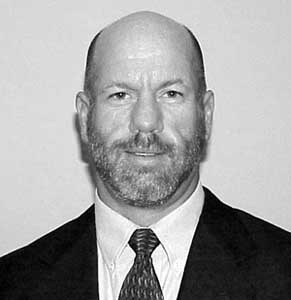feature
Champion of Pride: Jess Durfee
Published Thursday, 24-Jul-2003 in issue 813
Champion of Pride award recipient Jess Durfee is driven, hardworking and very well informed. A long time GLBT activist, Durfee currently serves as president of the San Diego Democratic Club (SDDC), is co-chair of the Human Dignity Ordinance (HDO) Amendment Coalition and serves on The Center’s Public Policy Department Advisory Committee. In his copious spare time he holds several positions within the California Democratic Party and stays on top of current issues.
Durfee’s activism began in the ’80s in southwest Washington State when he and a friend created a group to advocate for GLBT rights in that area.
“I was living well away from the Seattle metropolitan area in a portion of the state that didn’t really have any organized, active or visible LGBT community, and certainly no activism. Later, when there was a statewide organization formed, we just became part of [that group] and I then became part of the board for that organization,” Durfee said.
In the early ’90s, Durfee became involved in the Hands Off Washington campaign. At that time, right wing demagogue Lon Mabon was trying to bring anti-gay legislation from his home state, Oregon, into the state of Washington. With Durfee’s help, Hands Off Washington galvanized the GLBT communities within the state to prevent Mabon from getting any anti-gay legislation on the ballot and spreading his hatred across the Columbia River.
Durfee moved to San Diego in the mid ’90s and, after taking a little time to work on his house, immersed himself in local GLBT activism by joining up with Voices ’96, the GLBT response to the San Diego based Republican National Convention. The platform for Voices ’96 had five distinctive points: legal protection, recognition of lesbian and gay families, condemnation of hate crimes, funding for HIV research and support for GLBT youth. After the convention ended, Durfee and a few core volunteers from Voices ’96 formed a group called Voices for Justice, of which he became chair.
“Voices for Justice lasted about five or six years. We got some grant money and we were a key player in the repeal of Municipal Code 5619, which dealt with cross-dressing. It was illegal in San Diego to cross dress while committing another crime,” Durfee explained.
Durfee’s group felt that Municipal Code 5619 was just another way to discriminate against transgender persons and its repeal was yet another victory in the fight to give the transgender community equal protection under the law. In a related issue, as the co-chair of the HDO Amendment Coalition, Durfee and his group have so far been successful in their effort to add transgender citizens to the list of those protected under the San Diego’s Human Dignity Oridance, which currently prohibits discrimination based on sexual orientation but does not contain language to include transgender people. The City Council unanimously voted to add the protections on July 14. They most vote in favor of the protections again on July 28 before they become law.
As president of the San Diego Democratic Club and as a member of The Center’s Public Policy department’s advisory committee, Durfee stays on top of local political issues and advocates for fairness and equality for the GLBT community. In a recent issue of SDDC’s newsletter, Durfee described some of the issues that the advisory committee and SDDC are working on together.
“The SDDC works very closely with The Center on everything from pressuring the city to end its Boy Scout lease, to monitoring LGBT legislation, to keeping an eye on the far-right zealots on the suburban and rural school boards around the county.”
Durfee remembers attending his first Pride celebration in the mid- ’80s in Portland, Oregon. “The very first time I marched in a Pride parade was when I was a school teacher, and it was scary to actually march in a parade, especially with TV cameras,” he said.
Though the GLBT community has come a long way since the early days of Pride celebrations, Durfee feels Pride parades still have their place in the struggle for GLBT equality and visibility.
“I don’t know that we ‘need’ [Pride parades] but they certainly are a wonderful thing. We need them no more than the U.S. needs a Fourth of July celebration, but I think there’s a purpose for it and that is to come together as a community, to celebrate what we have achieved in terms of the movement and to look toward the future when we achieve full and equal rights.”
|
|
Copyright © 2003-2025 Uptown Publications


